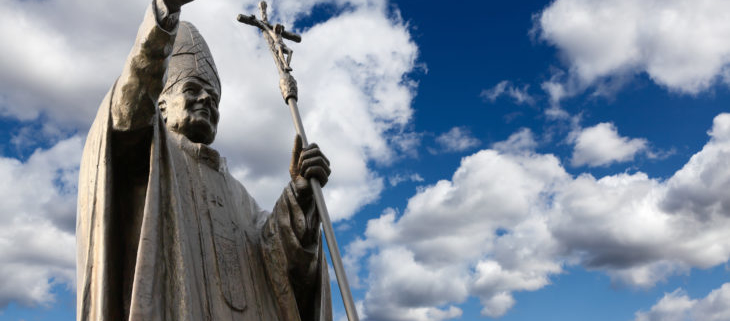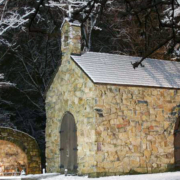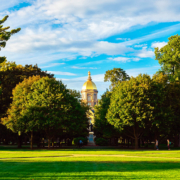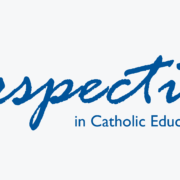The Restoration of a Catholic ‘Idea of a University’
Editor’s Note: The Cardinal Newman Society is releasing several articles marking the 50th anniversary of the devastating Land O’Lakes Statement, in which several Catholic university leaders declared Catholic universities independent from “authority of whatever kind, lay or clerical, external to the academic community itself”. In considering the future of Catholic education, it’s impossible to ignore the past. “How did we get here?” is a question essential to determining how many American Catholic colleges and universities can overcome their conformity to secular norms for curriculum, campus life, governance, and academic freedom. Ultimately, these articles serve as hope that the mistakes of the past can be corrected and that God will bless the renaissance of faithful Catholic education in the United States that is underway.
This article was originally published in The Enduring Nature of the Catholic University, a collection of essays released by The Cardinal Newman Society in 2009.
The 1967 “Land O’Lakes Statement” by leading Catholic educators precipitated a revolution in Catholic higher education that amounted to heresy and schism.1 Major Catholic universities in the United States—Notre Dame, St. Louis University, Georgetown, and Boston College, to name a few—proclaimed their independence from the Magisterium of the Church. Claiming that “the Catholic university must have a true autonomy and academic freedom in the face of authority of every kind, lay or clerical, external to the university itself,” the Land O’Lakes Statement announced its separation from the teaching authority and hierarchy of the Church and established its own magisterium, what Monsignor George Kelly called “a two-headed church.”2 Substituting liberal modernism for Catholic orthodoxy, the Land O’Lakes Statement viewed the mission of the college as conformity to the “modern,” as an education “geared to modern society”3 that resists “theological or philosophical imperialism.”4
Naturally, because no man can serve two masters, Catholic universities that subscribed to the Land O’Lakes Statement disowned their patrimony—the university as a gift from the heart of the Church, Ex corde Ecclesiae—and embraced the model of the secular university with its alleged uninhibited academic freedom. As the Statement reads, nothing is to be “outlawed,” and academic freedom means “no boundaries and no barriers.”5 The consequences of this commitment to the modernist movement are legion: the separation of faith and reason, the loss of Catholic identity, the reign of secular ideology, the establishment of moral relativism as the touchstone of truth, and the loss of an honorable academic heritage rooted in the wisdom of the ages.
Two modern papal pronouncements, John Paul II’s Ex corde Ecclesiae (1990)6 and Benedict XVI’s “Address to Catholic Educators” (2008),7 study this crisis in Catholic higher education and seek to restore the ideals of Catholic higher education. The two popes review the venerable tradition of Catholic learning as a treasury of wisdom that spreads the riches of the Gospel, humanizes and civilizes persons, promotes the dignity and inestimable worth of all human beings, and serves the common good of all societies.
As Pope John Paul II writes, the heritage of the Catholic university cultivates “the joy of learning” and rejoicing in the truth (St. Augustine’s gaudium de veritate).8 It teaches the ability “to think rigorously… to act rightly and to serve humanity better.”9 He argues that, contrary to the opinion of the Land O’Lakes Statement, a Catholic university never stifles the life of the mind or the passion for truth, because Catholic higher learning “is distinguished by its free search for the whole truth about nature, man, and God” and “is dedicated to the research of all aspects of truth in their essential connection with the supreme Truth, who is God.”10 The Catholic university does not inhibit research or censor the quest for knowledge but insists on “the moral, spiritual, and religious dimension” of research and judges the methods and discoveries of science “in the perspective of the totality of the human person.”11
Thus the Catholic Church, “expert in humanity,”12 in its teaching authority always reserves the right to determine the norms of legitimate research and judge the uses of technology and medical procedures as either moral or immoral, as humanizing or dehumanizing, as upholding the dignity of human beings or exploiting persons as objects or instruments. In other words, neither academic freedom nor human freedom are absolute. Although the birth control pill, embryonic stem-cell research, and cloning have acquired respectability in the medical and scientific professions, the Magisterium of the Church exercises a higher standard than the secular world’s criteria of utility, pragmatism, and progress.
Likewise, Pope Benedict XVI’s address warns educators that the test of truth goes beyond contemporary intellectual fashions, whether it is “the cold pragmatic calculations of utility” that determine right and wrong on the basis of self-interest or cost-effectiveness, the “positivistic mentality” that exalts the scientific method and empirical data as the ultimate test of objective truth or “secularist ideology” that divorces reason and faith and reduces truth to political opinion.13
While the Catholic university welcomes all knowledge from the many fields of learning and honors the freedom “to search for the truth wherever careful analysis of evidence leads you,” this human knowledge does not qualify the modern university’s pursuit of academic freedom “to justify positions that contradict the faith and the teaching of the Church.”14 Revealed knowledge and the divine wisdom of God from Scripture, tradition, and the teachings of the Magisterium represent eternal and ultimate truths that subordinate man’s knowledge and human wisdom. That is, if worldly wisdom in the form of legal decisions, medical ethics, and political views claims the “right” to abortion, euthanasia, or same-sex marriage, the Church judges these views in the light of revealed truth, eternal law, natural law, and the teachings of the Church’s encyclicals.
In short, contrary to the Land O’Lakes Statement, academic freedom, scholarly knowledge, and human opinion possess no independent authority or autonomy exclusive of the Church. As Cardinal Newman explains in The Idea of a University,15 when the circle of knowledge excludes theology from the body of truth, it creates a void. Because nature abhors a vacuum, other fields of knowledge then usurp the authority of theology and assume airs of their own infallibility. Newman writes, “Religious doctrine is knowledge, in as full a sense as Newton’s doctrine is knowledge. University teaching without theology is simply unphilosophical. Theology has at least as good a right to claim a place there as astronomy.”16 The modern, then, must be judged in the light of the ancient, and science must be judged in the light of theology. The question is not only “Is it possible?” but also “Is it moral?”
Given the recent crisis in Catholic higher education and its renunciation of its venerable ideals of transmitting the fullness and unity of the truth, the treasury of wisdom from great art and literature, its integration of reason and faith, and its education of the whole person, how can Catholic higher education in the modern world restore its sublime vision of “the idea of a university”? How does it once again reclaim its special identity as many small Catholic alternative colleges strive to create a living Catholic ethos on their campuses?
Fifty percent of education consists of atmosphere, G. K. Chesterton remarked, and one of the marks of authentic Catholic education is the culture or environment that it creates. In the right atmosphere or environment, natural, vigorous growth follows whether it is the life of a plant, an animal, or a human being—whether it is the life of the mind, the heart, or the soul. As Pope Benedict XVI proposed in his “Address to Catholic Educators,” the renewal of Catholic higher education requires colleges with a distinct, unmistakable Catholic identity. He asks, “Is the faith tangible in our universities and schools? Is it given fervent expression liturgically, sacramentally, through prayer, acts of charity, a concern for justice, and respect for God’s creation?”17
This aura of a genuine Catholic culture expresses itself in small things and in great matters. Do young men and young women dress in good taste and beautiful modesty and behave with gracious civility and cheerful affability? Is theology an integral part of the curriculum, and are students introduced to the riches of Scripture, the wisdom of the church fathers, and the lives and writings of the saints? Does the ordinary life of students allow for friendship, conversation, athletics, contemplation, and prayer—a balanced, rhythmic life of work and play, activity and rest? Does the curriculum instill in students a desire to discover knowledge, to love the truth, to defend the good, and even to suffer for noble ideals such as the right to life and the defense of traditional marriage? Does the college introduce students to “the best which has been thought and said”18 in the books and courses that form the course of study?
Bona fide Catholic colleges manifest tell-tale signs that introduce students to a world that radiates purity, charity, joy, and wonder—what the Greeks called the art of living well as opposed to merely living, surviving, or earning a livelihood. As Benedict XVI states, “Catholic identity is not dependent upon statistics. Neither can it be equated simply with orthodoxy of course content.”19 A day in the life of a true Catholic university reveals prayer, learning, conviviality, charity, and service—daily Mass, the study of great subjects or classics, the joy of learning for its own sake, the graces of friendship, civility, and hospitality. This atmosphere is always reflecting goodness, beauty, and truth in its myriad forms—in St. Paul’s words, “whatsoever things are true, whatsoever things are honest, whatsoever things are just, whatsoever things are pure, whatsoever things are lovely” (Phil 4:8). Thus, a Catholic university brooks no tolerance for the base, the ugly, the tawdry, or the banal. Rock music, prurient or lewd films, access to internet pornography, or student organizations that promote homosexuality all poison the entire ambience of a Catholic university and rob it of its identity.
An authentic Catholic college, then—like a loving home—breathes life and invites participation. It cultivates an atmosphere that makes truth good (“Taste and see the sweetness of the Lord,” declares the Psalmist in Psalms 34:8), associates the beautiful with the true (“Glory be to God for dappled things,” writes Gerard Manley Hopkins)20, and equates the good with the true (“You love us, Lord, as if we were the only one,” St. Augustine states). Whenever truth, goodness, and beauty are appreciated and cherished for their own sake—as ends in themselves—they create what Cardinal Newman calls an “overflow.” Newman explains: “Good is not only good, but reproductive of good; this is one of its attributes; nothing is excellent, beautiful, perfect, desirable for its own sake, but it overflows, and spreads the likeness of itself all around it.”21 In this atmosphere of overflowing and spreading, prayer, love of learning, and mirth happen naturally, and students acquire a sense of the excellent, the highest, and the noblest—the Christian ideals that restore man’s dignity and remind him of the meaning of being a human being created in the image of God.
As Pope Benedict remarks in his “Address to Catholic Educators,” a Catholic college that inspires the imitation of Christ moves a person “to lead a new life characterized by all that is beautiful, good, and true.”22 This aspiration for transcendent values and eternal truths provides student with a moral vision that transcends popular culture, political ideology, and moral relativism—the mentality of “political correctness.” Benedict XVI writes, “Similarly the Church never tires of upholding the essential moral categories of right and wrong” lest man embrace the “cold pragmatic calculations of utility which render the person little more than a pawn on some ideological chess-board.”23 In the environment of a Catholic college, a student learns that truth is divine in origin, not man-made; he discovers that truth is eternal and universal, not relative or subjective; he recognizes that faith and reason complement one another and, in Benedict XVI’s words, “never contradict one another.”24 As the Pope explains, a Catholic college that informs minds with the light of divine wisdom teaches that “it is not praxis that creates truth but truth that should serve as the basis of praxis.”25 In short, the intellectual atmosphere of a Catholic college creates an environment that exemplifies the liberating academic spirit of St. Thomas Aquinas, who frequently quoted St. Ambrose: “All truth, whoever said it, comes from the Holy Spirit.”
Rising above the platitudes of secular ideologies that profess “diversity” and “tolerance” as absolute values and that define the autonomous individual as the ultimate authority of truth (Protagoras’ “man is the measure of all things”), a Catholic intellectual culture pursues what Benedict XVI calls “the fullness and unity of truth”26—divine revelation, tradition, the wisdom of the past, the universality of great art and literature, the lessons of history, and the laws of science. In short, the intellectual culture of a Catholic college creates in the mind a sense of “enlargement” to use Cardinal Newman’s word from The Idea of a University27—the antithesis of intellectual trendiness or narrow ideology. Hence authentic Catholic colleges do not confer honorary degrees to heretical thinkers, welcome guest lecturers, or hire faculty that profess ideas that oppose the Church’s teachings on faith and morals. Like the Christian faith, a Catholic university is countercultural.
The environment of a Catholic college instills refinement in manners, morals, feeling, and thinking. In The Idea of a University, Newman argues that a liberal education forms a quality of mind that acts upon man’s moral nature and sensitizes him to practice acts of courtesy and honor in virtues such as “veracity, probity, equity, fairness, gentleness, fairness, benevolence, and amiableness”28—all qualities that elevate human life and create a civil society. This refinement of mind acquires a natural taste for the noble, the chivalrous, and the ideal—what Newman calls “a fastidiousness, analogous to the delicacy or daintiness which good nurture or a sickly habit induces in respect of food.”29
This appreciation for high standards develops a discernment about the difference between proper and improper, civilized and barbaric, and excellent and mediocre—a sense of discrimination that forms “an absolute loathing of certain offences, or a detestation and scorn of them as ungentlemanlike.”30 Thus a liberal education fosters a moral sensibility that refuses to lower itself to crude manners, coarse language, or small-minded meanness. A refined mind possesses what Newman calls “a safeguard” or sense of shame that inhibits vulgarity or boorishness unworthy of a gentleman or lady—“an irresolution and indecision in doing wrong, which will act as a remora [delay] till the danger is passed away.”31 Hence, an authentic Catholic university will never host films, plays, or musical performances that give offense and stoop to bad taste, vulgarity, and obscenity in the name of academic freedom.
Another mark of Catholic education is a commitment to universal knowledge. John Paul alludes to a Catholic university’s “free search for the whole truth about nature, man, and God,”32 and Benedict XVI refers to the university’s obligation to communicate “the objective truth which, in transcending the particular and the subjective, points to the universal and absolute….”33 This thesis of course informs Newman’s The Idea of a University: “A university, I should lay down, by its very name professes to teach universal knowledge.”34 This type of liberal or classical education, then, values the great books of the past and immerses students in the classical-Christian tradition of Western civilization that illuminates the meaning of a “perennial philosophy” or knowledge of the “permanent things” such as the human condition, the unchanging nature of the human heart, the truth about love, or the ideals of manhood and femininity.
As students discover the permanence and continuity of universal knowledge by learning of the indebtedness of Plato to Socrates, Virgil to Homer, Dante to Virgil, Chaucer to Dante, or Dante to Aquinas, their study of the classics illuminates their minds with an understanding of the nature of wisdom—what is true for all people in all times and in all places. The restoration of Catholic higher education requires courses of study inspired by these great minds and masterpieces at the heart of the curriculum. As C.S. Lewis observed, not to have read the classics is like never having drunk wine, never having swum in the ocean, and never having been in love. The modern substitution of other studies for bona fide liberal arts courses in the humanities destroys the whole idea of universal knowledge as the essence of the university and creates the problem of “fragmentation” that Benedict XVI cites as a problem of the modern university.35
Because the genius of Catholicism consists of its balanced view of all of reality and the whole nature of man—its appreciation of both scientific knowledge and divine revelation, its respect for both reason and faith, its recognition of man as both body and soul, its confidence in both nature and grace—a Catholic university nourishes the mind, body, heart, and soul of its students, aspiring for the golden mean of a sound mind in a sound body, a charitable heart and a lively intelligence, social graces and a contemplative life. A Catholic university is not a place for technical training, an athletic camp, endless political activity or a monastic life. As Benedict XVI writes, “Truth speaks to the individual in his or her entirety, inviting us to respond with our whole being.”36 A Catholic university that speaks to persons in their entirety instills a love of leisure and the enjoyment of play as the essence of human happiness and as a reminder of man’s spiritual and religious nature—man’s need to rest on the Sabbath and worship God, to restore his strength and uplift his heart.
While a Catholic university forms virtues of mind, heart, and conscience that ennoble human work and elevate human society, it also instills an appreciation for the life after work—the capacity to enjoy all of life’s simple and aesthetic pleasures from the delight in friendship and hospitality to a love of music and art. This cultivation of the whole person—the senses, the imagination, the intellect—serves a person both at work and at play for a lifetime. In short, a Catholic university that addresses “the whole being” of man awakens a love of life in all of its abundance and richness. However, when modern universities disown their obligation of authority in loco parentis, create occasions of sin and temptation with coeducational dormitories, and ignore the physical health and spiritual well-being of students with ready availability of contraceptives, they do not show care for the whole person.
“See how they love one another,” the pagans said of the early Christians. The first followers of Christ possessed an unmistakable identity. They honored their marriage vows, they did not abandon their children to die on the mountains, and they practiced charity in the way they shared their possessions. “See how they live. See how they talk and treat one another. See how they play. See how they learn. See what they study. See how they think,” observers should say of the Catholic university as they see the light in the eyes, the joy and peace in the hearts, the kindness in the actions, the mirth in the games, the wonder in the minds, and the image of God in the souls of students and teachers doing their ordinary work in their part of the vineyard living in the world but not of the world.
It is important to be reminded that Christ taught us, “By their fruits you shall know them” (Mt 7:16). Certainly that applies to Catholic education. To be faithful to the Lord’s admonition, Catholic colleges must address the whole person—mind, body, heart, and soul—and illuminate the meaning of wisdom, purity, charity, and God’s mystery.
- International Federation of Catholic Universities, “Land O’Lakes Statement: The Nature of a Catholic University,” article 1 in Alice Gallin, O.S.U., ed., American Catholic Higher Education: Essential Documents 1967-1990 (Notre Dame: University of Notre Dame Press, 1992), pp.7-12, hereinafter referred to as “Land O’Lakes.”
- George A. Kelly, “The Battle for the Catholic Campus,” The Catholic World Report (January 1995).
- International Federation of Catholic Universities, “Land O’Lakes,” p.10.
- Ibid., p.8.
- Ibid., p.10.
- Pope John Paul II, apostolic constitution Ex corde Ecclesiae, August 15, 1990 (Vatican: Libreria Editrice Vaticana, 1990).
- Pope Benedict XVI, “Address to Catholic Educators at The Catholic University of America,” April 17, 2008.
- Pope John Paul II, Ex corde Ecclesiae, 1.
- Ibid., 2.
- Ibid., 4.
- Ibid., 7.
- Pope Paul VI, “Allocution to Representatives of States,” October 4, 1965: Insegnamenti di Paolo VI, Vol. III (1965), p.508.
- Pope Benedict XVI, “Address to Catholic Educators.”
- Ibid.
- John Henry Cardinal Newman, The Idea of a University (London: Longmans Green & Co., 1907).
- Ibid., p.42.
- Pope Benedict XVI, “Address to Catholic Educators.”
- Matthew Arnold, Culture and Anarchy (New York: Macmillan & Company, 1883), p.xi.
- Pope Benedict XVI, “Address to Catholic Educators.”
- Gerard Manley Hopkins, “Pied Beauty” in Poems of Gerard Manley Hopkins (London: Humphrey Milford, 1918).
- Newman, p.164.
- Pope Benedict XVI, “Address to Catholic Educators.”
- Ibid.
- Ibid.
- Ibid.
- Ibid.
- Newman, p.125.
- Ibid., p.189.
- Ibid., p.187.
- Ibid., p.187.
- Ibid., p.187-188.
- Pope John Paul II, Ex corde Ecclesiae, 4.
- Pope Benedict XVI, “Address to Catholic Educators.”
- Newman, p.20.
- Pope Benedict XVI, “Address to Catholic Educators.”
- Ibid.





 Photo by David Mark via Pixabay CC0
Photo by David Mark via Pixabay CC0 
